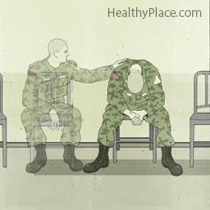Do I Have Combat PTSD? How is PTSD Assessed?
If you’ve returned home from a combat zone, you have likely experienced trauma, and almost all people who have experienced a trauma have some posttraumatic stress disorder (PTSD) symptoms as a result; however, this does not necessarily mean that you have combat PTSD. In order to be diagnosed with combat PTSD, a formal assessment must be made by a healthcare professional and you must have a set number of symptoms that raise to a certain level of severity. You cannot determine, yourself, if you have a diagnosis of PTSD.
There are changes in the brain in someone with combat PTSD and the symptoms they have fall into the categories of:
- Re-experiencing – a reliving of the past event
- Avoidance – avoidance of situations that remind you of the traumatic event
- Arousal – a feeling of being “keyed up” and always on the lookout for danger
- Negative changes in beliefs and feelings
What is a Combat PTSD Screening?
A PTSD screening attempts to ascertain the likelihood that a veteran has PTSD. A screening may be a very short list of questions that can indicate the need for a further, in-depth assessment for a formal diagnosis. A positive screening is not the same thing as a diagnosis.
What is a PTSD Assessment?
 If you do screen positively for PTSD, a more in-depth assessment should be made to see if you have an actual diagnosis of PTSD. Assessments can last as little as 15 minutes but more commonly take about an hour. If legal or disability claim information is needed, lengthy assessments may be required.
If you do screen positively for PTSD, a more in-depth assessment should be made to see if you have an actual diagnosis of PTSD. Assessments can last as little as 15 minutes but more commonly take about an hour. If legal or disability claim information is needed, lengthy assessments may be required.
The goal of an assessment is to determine what symptoms you are experiencing as a result of a trauma. This can be done through a set of standard questions, through a written test wherein you talk about your feelings and beliefs and even the feedback from a partner can be used to help create a full picture of what the veteran is going through.
It is critical to always be open and honest during a combat PTSD assessment in order to receive the correct diagnosis and treatment for your PTSD symptoms.
Who Should Assess You for PTSD?
Not just any healthcare provider should screen veterans for PTSD. The person conducting the assessment should:
- Specialize in the area of PTSD or, more specifically combat PTSD
- Have conducted at least 10 trauma assessments in the past
- Have had training specifically in PTSD assessment
- Ideally, be a member of a professional group related to traumatic stress
Remember, you can ask any care provider if they meet these qualifications ahead of time. You should only be assessed by someone who is qualified and by someone with whom you feel comfortable.
Why Get a Combat PTSD Assessment?
It’s critical to get an in-depth, diagnostic assessment for PTSD so you can receive the best care possible. It is absolutely the case that people with combat PTSD recover every day – but this recovery happens with hard work and with proper treatment. Without the assessment, you can’t start down the road that will lead to your eventual recovery.
A combat PTSD self-screening test is available here. If you test positive, please see a healthcare provider for a proper assessment.
You can also connect with Dr. Harry Croft on his website, Google+, Facebook, Linkedin and Twitter.
APA Reference
Croft, H.
(2014, July 31). Do I Have Combat PTSD? How is PTSD Assessed?, HealthyPlace. Retrieved
on 2026, March 4 from https://www.healthyplace.com/blogs/understandingcombatptsd/2014/07/do-i-have-combat-ptsd-assessed
